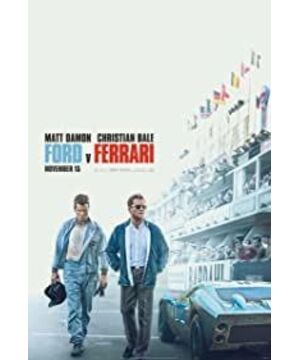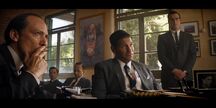I rushed to see the passionate racing scene with the two actor and actress, and felt unspeakable melancholy after watching "The King of Speed Cars".
The original title is straightforward, "Ford VS Ferrari". I thought it was the two drivers who tried their best to cross the finish line, and the protagonist would eventually win. But the games I won didn't make me feel happy, but there was endless loss. When I recollected the loss, I also realized that this is precisely the part of "Speed Car King" that is better than ordinary racing scenes:
It is not a race that a driver "wins", nor is it a race that a driver "loses".
Unexpected third protagonist
There are two protagonists in the story, Matt Damon, played by the retired driver Shelby, who turned to manufacturing business, and Christian Bell played by the unruly engineer and racing driver Ken Miles. In ordinary Hollywood dramas, these two people may become pros and cons. But "Speed King" does not follow the routine. They not only unite, but also unite to fight. It is not completely the rival Ferrari team, and the managers from Ford.
When the opening introductions of the two "losers" are finished, you know that Shelby, who has a congenital heart disease, can no longer race cars, and that the destitute Ken Miles has to commit himself to a car repair shop for his family. The camera suddenly turned, and a rather strange scene evoked——
A group of business people in suits and leather shoes with the same movements and expressions as replicas walked into the out-of-the-box car manufacturing factory. They were condescending, overlooking the beautiful assembly lines, full of greasy workers, like standing high in the jungle, just giving orders. Let the world stop or continue to turn. At this time, the real "third protagonist" came on stage, walked to the trumpet, and declared his ambitions——
"In 1899 my grandfather Henry Ford..."
What a brilliant entrepreneurial story, what a shocking speech, but now this factory has fallen into a quagmire. Ford is not only squeezed by Chevrolet in the American market, but the European market is a new continent and there is a niche Ferrari that relies on racing. Little Ford is old and very ambitious. On the surface, he still maintains the glory of a large enterprise. In fact, he has become a "loser" in the auto market.
The subtle language of the lens brings us new ideas-it turns out that this is not a simple drama where two heroes come back and rise, and an old man and three "losers" are added to unite to fight for a goal.
On the surface, this goal is to win the Ferrari team, but it actually contains three different life dreams:
Shelby and Ken Miles have to build a good car and win first place at Le Mans.
Ford wants to build a good car, get the first place in the Le Mans race, and regain the auto market.
This is the beginning of the passionate story. We thought that the three parties would join forces to make a bloody road, and the obstacle must come from the distant Italian rival Ferrari. Unexpectedly, the "obstacle race" started from the inside, all the way to Le Mans. We saw bit by bit that the real enemy was not the strong team led by Enzo Ferrari, but that Ford had already started from the top. The decayed management system, a kind of "bureaucracy" that we are so familiar with, has become pervasive.
The prevalence of bureaucracy
To be honest, I never imagined that in a Hollywood movie, I would see the screenwriter so blatantly set "bureaucracy" as an archery target, ruthlessly satirize it, humiliate it, and put it in front of the audience like skinny cramps, exposing it. Absurd, dark and ugly.
It is not a concrete enemy. Like what we are used to seeing in many hero movies, "behind-the-scenes", "big brother of the group", "self in the quagmire of the hero's failed past"... These are all obstacles that we are familiar with, because they are very specific. A character, a story.
However, "bureaucracy" does not clearly point to who is the culprit-even in "The King of Speed Cars", Ford CEO seems to be Shelby's internal enemy, but considering that he is "under one person, over ten thousand people" "" position and position, you can understand the balance between "Ford II" and the newcomer Shelby.
"Bureaucracy" is also not a specific past. It will not make heroes desperate like falling into a well. On the contrary, it will exist in the environment and in the air. It is difficult to get rid of, uncomfortable and difficult. Eradicate it.
The enemies of Shelby and Ken Miles were not exactly "Ford II" and his group of well-dressed white-collar workers. In fact, they must cooperate, one side pays money and the other side pays people, in order to face their rival Ferrari together. However, compared with Ferrari, the obstacles set by the pretender inside the enemy are more and more difficult to deal with- because it is abstract, it is a kind of thought, a habit, and it is affecting countless decisions from the past to the future. Executors and executors, until this beautiful and huge car factory is destroyed.
When Shelby was sitting in Ford’s beautiful conference room waiting to discuss with "Ford II", he saw a red document tossing around several times, but it never fell into the hands of a person who was really responsible for it, and finally understood the crux of the matter. .
Isn't the "red file" the moment when the enemy of the pretender showed his face? The way the red files are treated represents the way this group of people do things in this system. Everyone knows that a document is important, and package it in red, but no one will actually read it, solve it, and keep it in their hands, unless the document brings clear credit rather than risk.
When Shelby finally waited to enter the conference room, a scene he was ready to accept appeared-"Ford II" asked him, who was responsible for this failure? Everyone, from the president to the director, stood far away in their corners. They were separated from each other, kept silent, pretending to be far away from this matter. Only Shelby walked into the "vortex".
Those people, just like at the beginning, the same well-dressed, the same expressions of indifference, and even the same way of dealing with questions-they are like being taught a standard answer, and every tricky question appears to be filled in with this answer. Can. No one cares if they are wrong, they can always stay safe.
Such scenes, on the one hand, make me feel funny and absurd; on the other hand, it makes me feel cold.
——What is the way to deal with it? Can it really be beaten?
Ken, 45, knew the problem early.
When Shelby was initially ambitious to find him to join the car building, he said straightforwardly:
"Do you know the biggest difficulty?
They hate people like you because you are different from them. "
"Different" is precisely the most hated and jealous enemy of this system.
Conversely, Shelby and Ken’s greatest enemy is precisely the inhumane duplication, duplication and duplication of this system, always responding to changing situations with a superior attitude. No one really thinks about how to solve it.
What really disappoints you is that every manager is like a cheap product made by an assembly line—just like Ford in Ferrari’s eyes, its name already represents its style—the beautiful white-collar workers, regardless of their position, are only responsible for delivery. Order and please their superiors. They will never go beyond the assembly line and bear a little extra cost. As long as they sit down and sit securely, someone else will be responsible for problems.
What Ferrari despised, of course, is not the Ford who is eroding the market day by day, but the arrogant Ford who is still arrogantly fantasizing that he can return to his old glory at any time. Not only have they lost their enterprising spirit of innovation, but even building a good car is not a goal from the heart. "Ford II" just took a gamble, the people below just to please him, up and down all do it for vanity, and it is Ken and Shelby who are different from them.
The real arena, the real enemy
When Ken tried his best to surpass Ferrari's opponents, the end of victory was near. How many difficulties have been overcome in the past, the difficulties of people, the difficulties of building cars, the difficulties of my own family, and the discord with the companions... Before the limit of 7000 revolutions, they all became nothing.
When the vehicle speed reaches its extreme, time and space are relatively static. We suddenly understood what Shelby said at the beginning. It was an empty state: we could not see the enemy, we could not see the front, and we could not see the back. We only felt ourselves and wanted to ask "Who am I".
This detached touch is like the loneliness of Matthew McConaughey in "Interstellar Crossing" when he travels through the universe alone. But things are counterproductive. The transcendence in "Speed Car King" is not worthy of a hero who has reached the limit with tears. A ridiculous phone call declares his dream shattered-"Please slow down and cross the finish line with your partner."
What? Does it make sense? Wouldn't the goal be achieved by winning the championship? The lingering "bureaucracy" will come as promised at the moment of victory-after all, victory is everyone's, and failure is personal. They don't want to see that they are so incompetent, and even the victory of "different" will have to cope with them and become the same as them.
Shelby eventually made the balance and compromise Shelby, but what is sad is that the unruly Ken also learned to give in.
He, a man who would rather smash the trunk with a hammer than meet the standards, made an incredible concession at the most critical moment. Slow down and wait for your partner-the willingness to have to smooth my edge makes my heartache.
However, the deadliest is yet to come.
When Ken put his guard down and crossed the finish line with the other two Ford drivers, it was not an obvious champion that greeted him, but a small trick that took advantage of the standard loophole, which made him fall short, missed the championship, and hated the field.
I really want to curse, "It's too unfair!" But those so-called partners, just like at the beginning, abandon the desperate people indifferently. They rushed towards their own victory, no matter how shameful the result was, whether it was stolen or snatched, they all pretended that they had obtained it with peace of mind.
See it! This is what the real enemy does.
This is the goal that the real enemy will never give up at the last moment.
This is where they put all their thoughts and efforts.
They do not care if you are going to die, whether you are the real winner or not. As long as Guangxian ultimately belongs to them, they can take the world for granted.
Decayed rules, decisions, and procedures have affected one person after another. From "Ford II" to the racer who won the championship, everyone is a stepping stone in the festering system, using laziness, deceit, and vanity to build a tall and decadent tower.
What made me lose was not only the bitterness of the protagonist's hatred of the arena, but also the construction of this decadent tower. ——And as long as such rules are effective, it will build higher and higher, becoming more and more inexhaustible, and everyone is willing to become a part of the tower.
Will you be disappointed? Must be disappointed. But did he guess it? Maybe he didn't care anymore.
It was his compromise that made Shelby understand that in the face of "bureaucracy", balance is not the winning method, and compromise does not represent their personal growth. Collectivism is not a panacea. What really makes them win is not the cooperation with a group of mediocre people, but their own heart, willing to give everything for their dreams.
Unexpectedly, it was Ferrari who finally sided with Ken. The old man took off his hat and saluted him. He is the real winner, winning courage, winning dreams, and winning victory beyond himself. That is much more important than a trophy or a photo.
The loss accompanies me. Even though the race is over, I still remember this should not be the ending of a Hollywood racing movie.
"Bureaucracy" was lashed so pungently, but in the end it did not appear as it should be in the Shuang film.
Although "Ford II" made us feel ironic the moment he got on the car and scared to pee, in the end he didn't grow up in this story, and he didn't transform into a brave, innovative person like his grandfather. He still lives in a beautiful cage, like a tamed tiger dreaming that he once owned a forest. After he tasted the sweetness of being fed by people, he continued to relax, and led more and more people to live in vanity. inside. They were not changed by Ken or Shelby.
This may be the brilliant place of "Speed Car King". Because reality is not a cool film. It's not that you hate the enemy and the enemy will disappear, but if you compromise, it will succumb. It is more likely to continue to decay and darken, even more stubborn, stronger, and affect more and more people.
What really lost me was the metaphor of this game. "Ford VS Ferrari", the "VS" in the title, is it just a duel?
uncertain.
Maybe it is an endless contest. Laziness versus diligence, hypocrisy versus sincerity, good-looking versus low-hand versus down-to-earth, shirking responsibility versus courage, most people versus a few, mediocrity versus difference...
There is no end time for this game.
View more about Ford v Ferrari reviews











